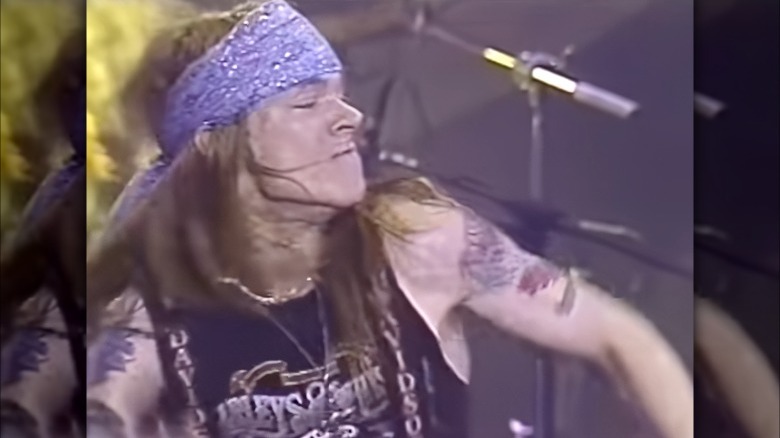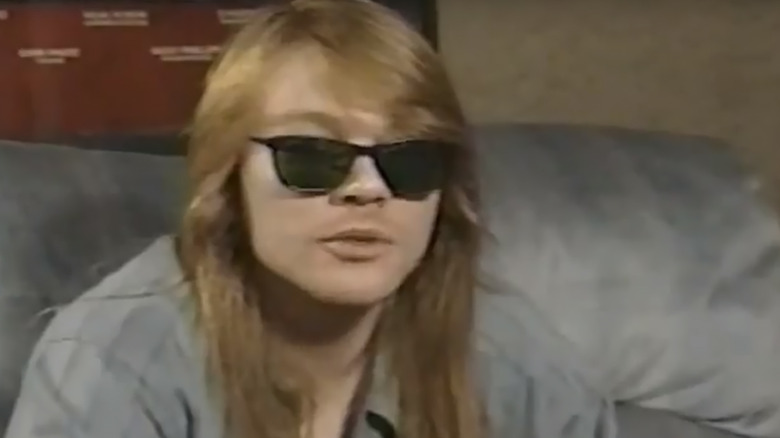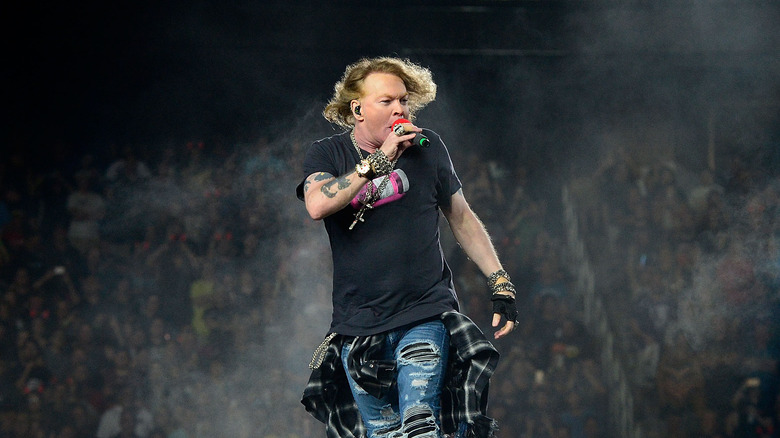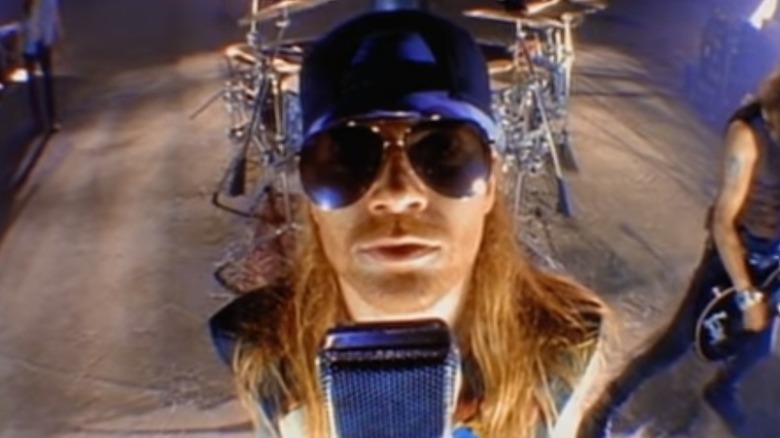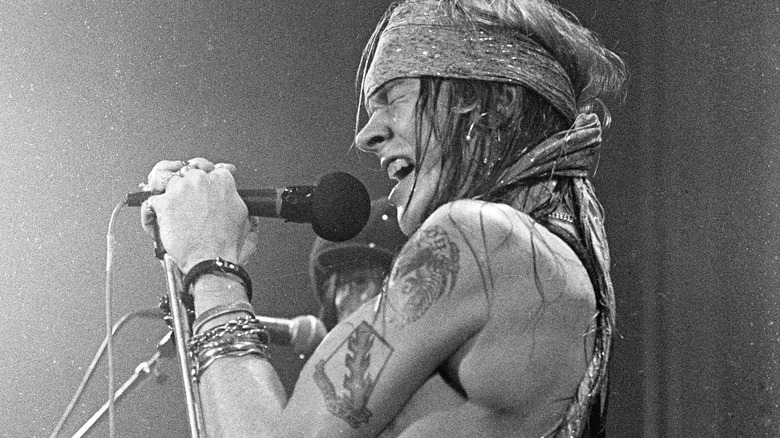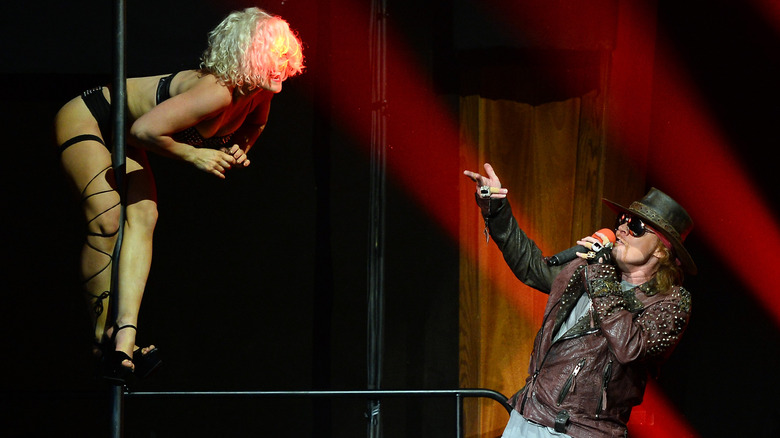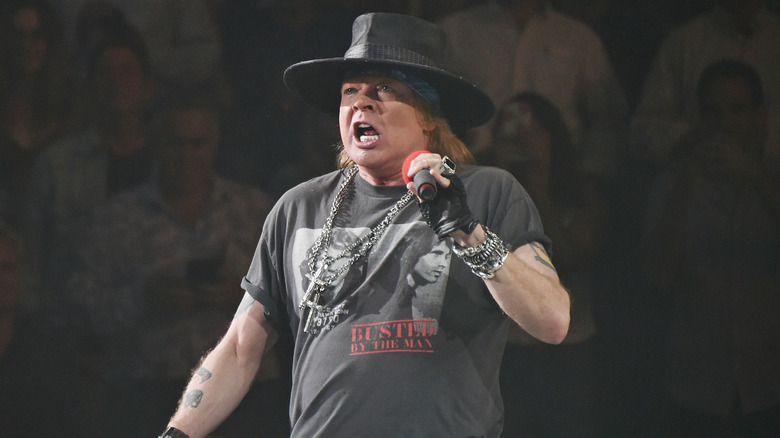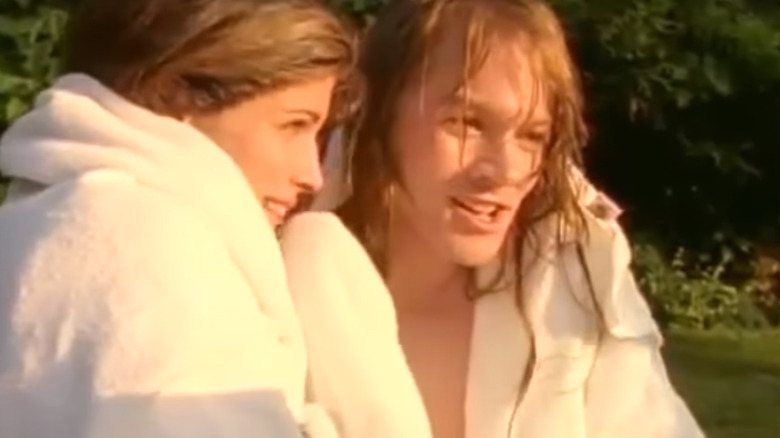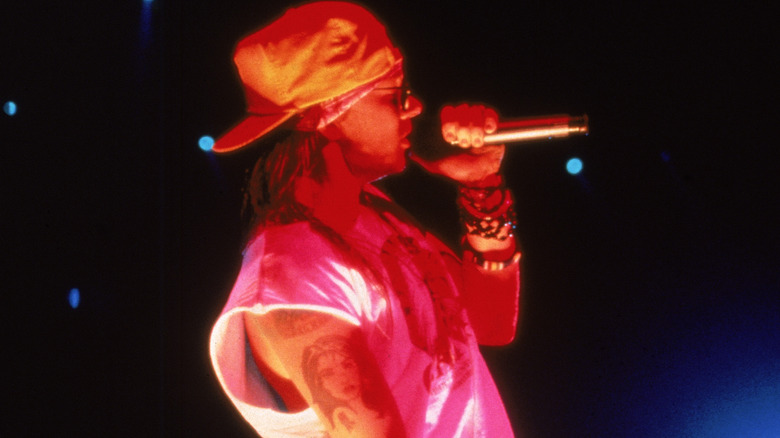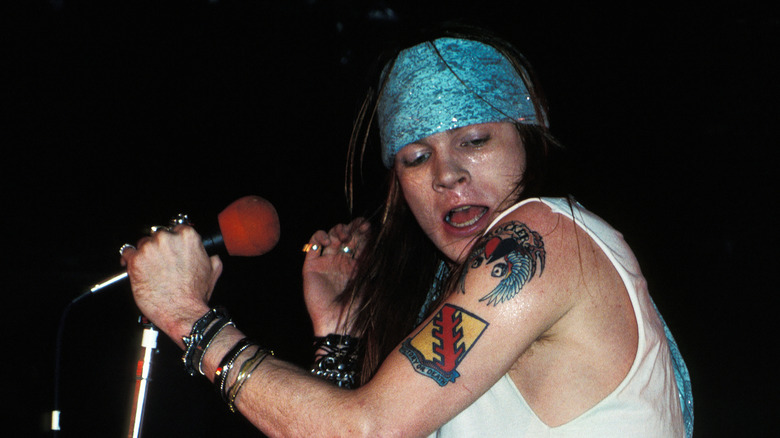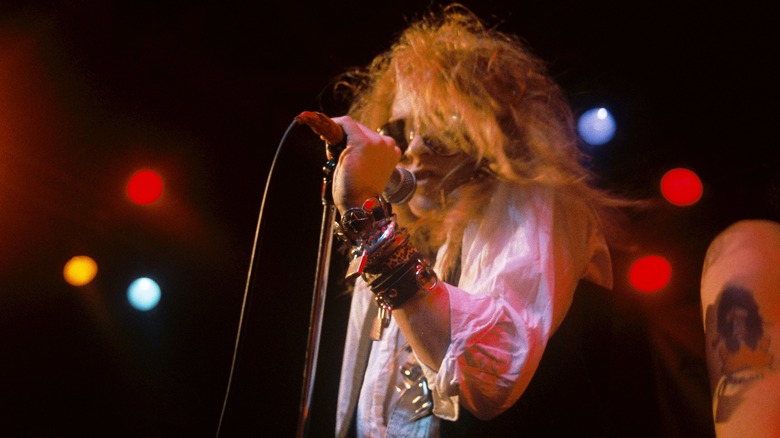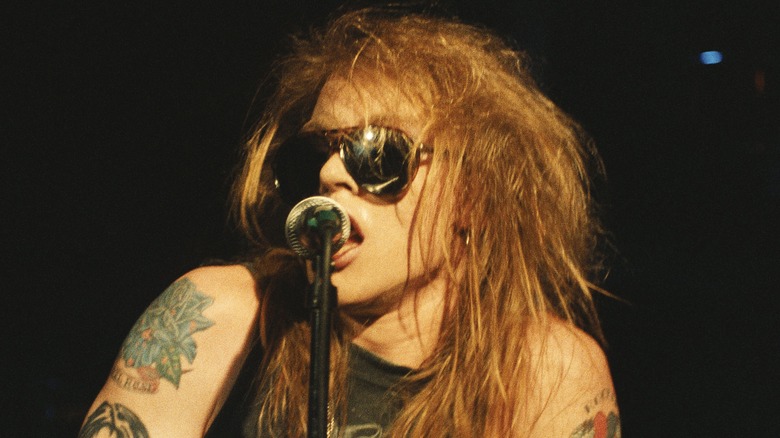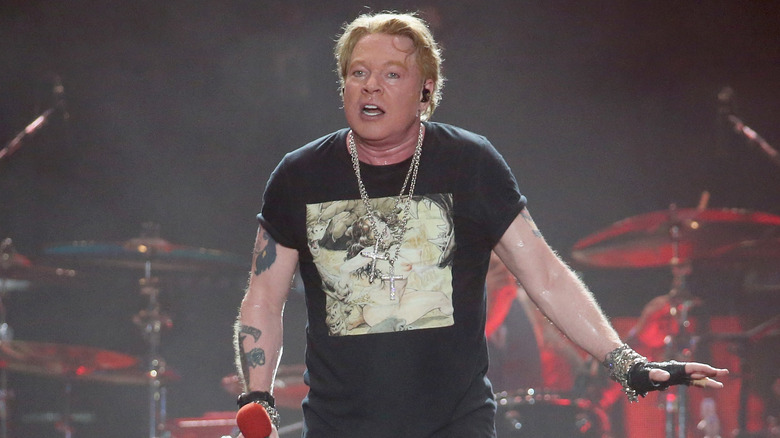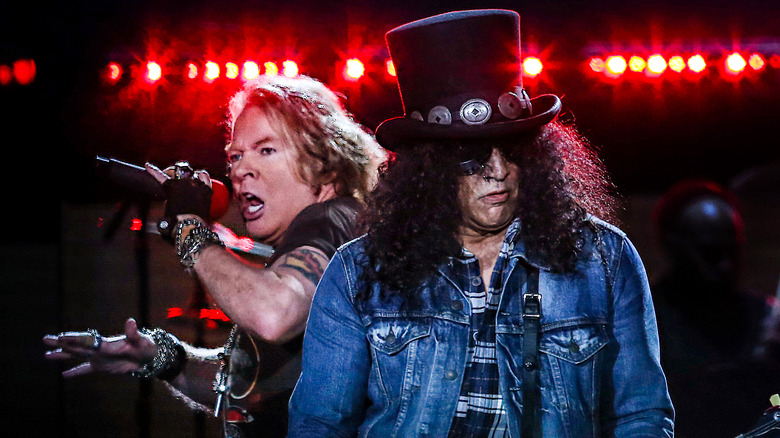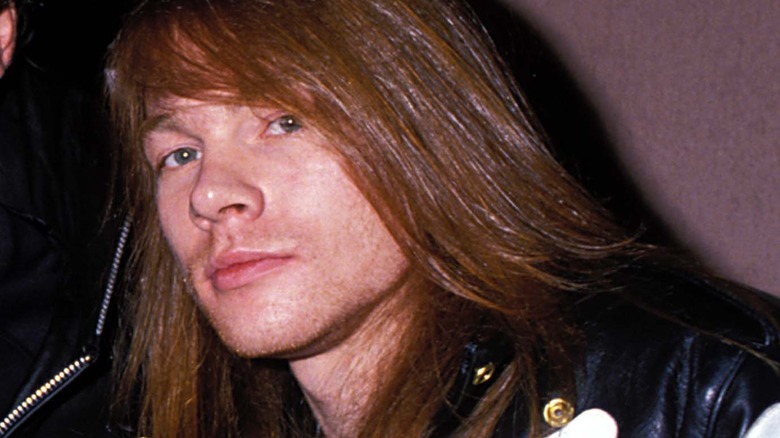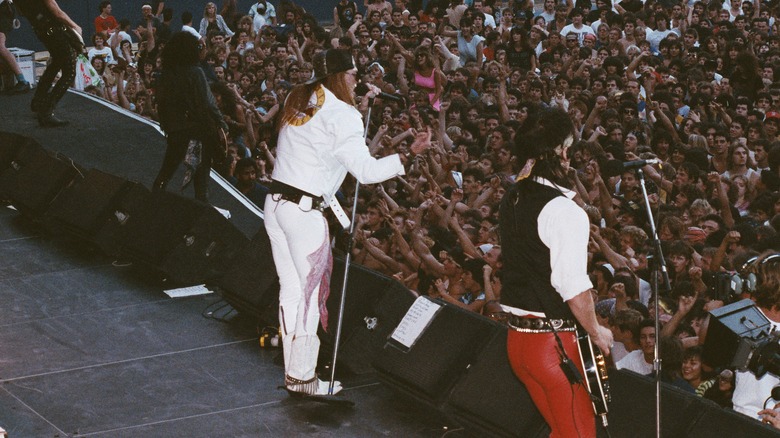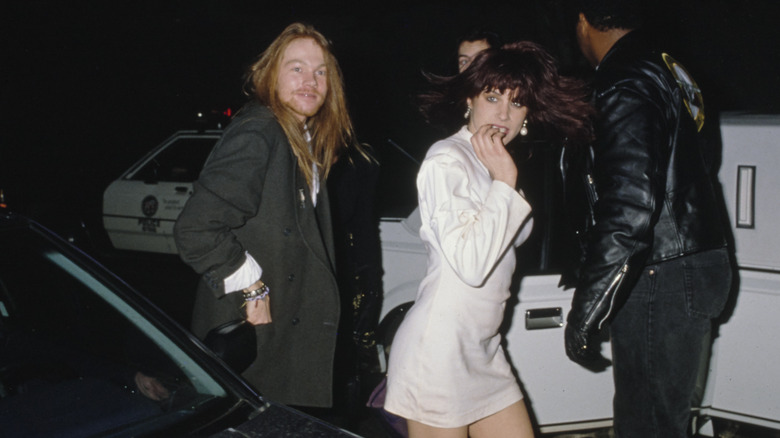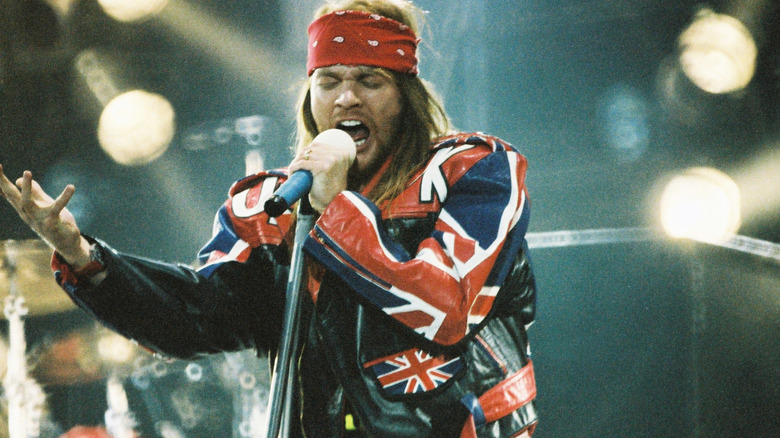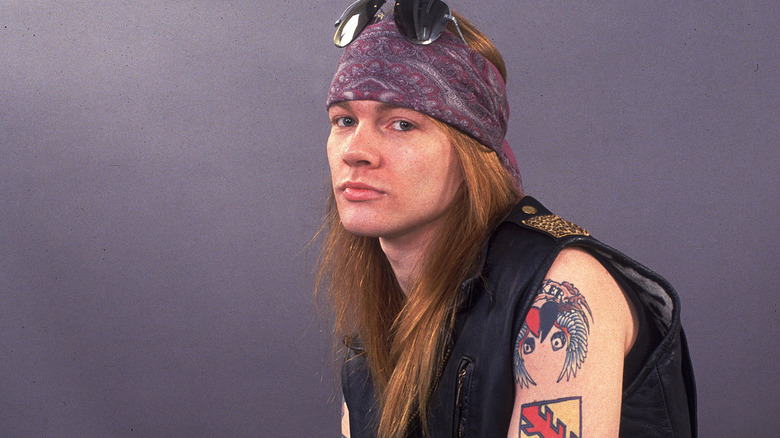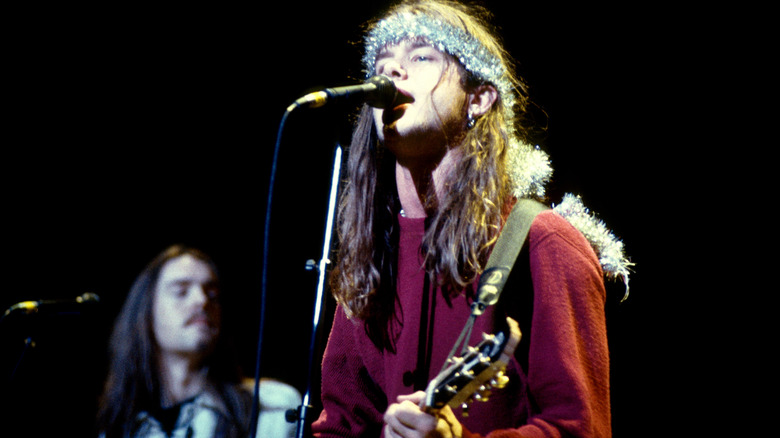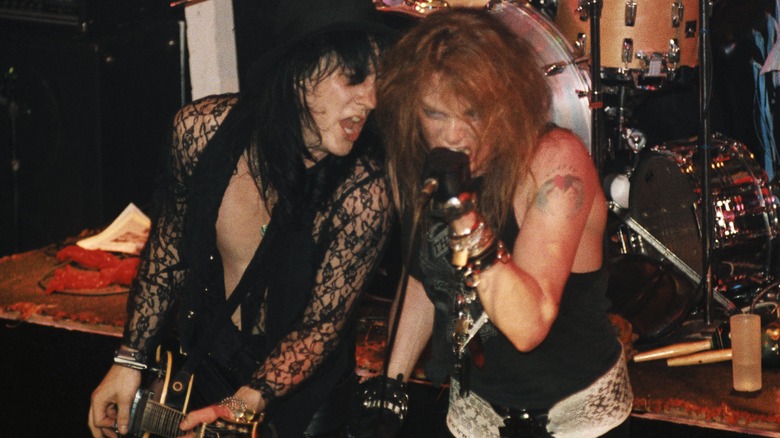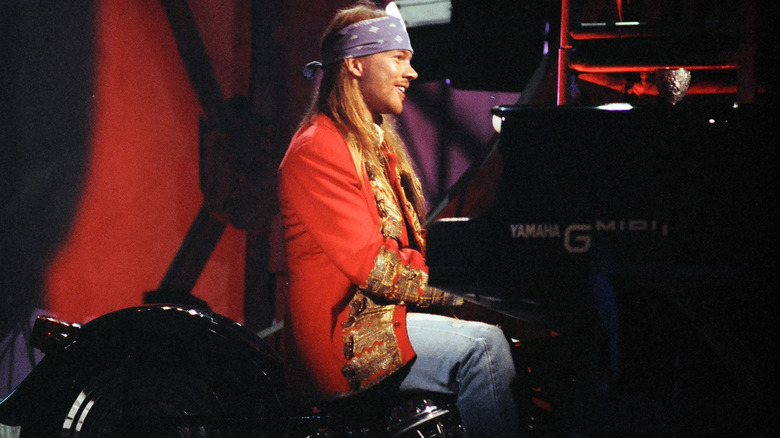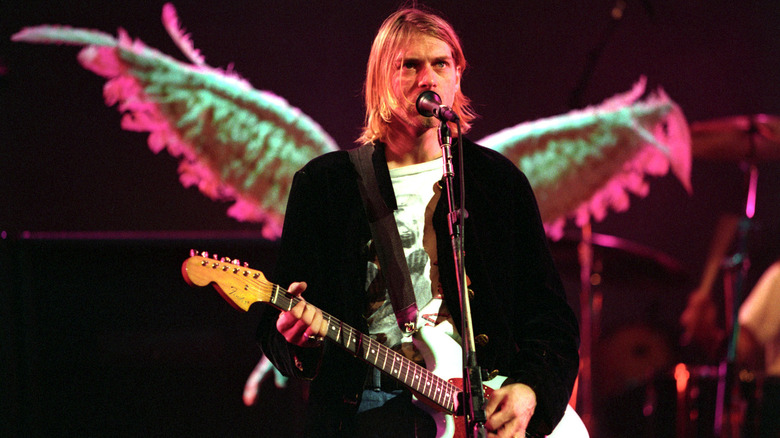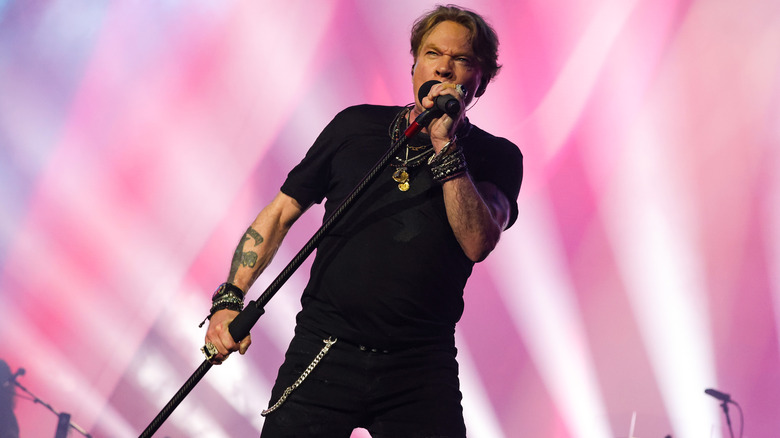Axl Rose's Tragic Real-Life Story
One of the aspects of Guns N' Roses' music that fans love most is its sheer ferocity. Who can hear "Welcome to the Jungle," "You Could Be Mine," "Garden of Eden," "Mr. Brownstone," or a couple dozen other tunes without recognizing that snarl, that explosiveness, that feral energy? Yes, the band's instrumental nexus, built around Slash's guitar and Duff McKagan's bass, provides the music that illuminates the danger expressed in singer Axl Rose's lyrics, but Rose's delivery makes you believe every word he sings. And considering Rose's rocky journey through life, that just might be the truth.
Rose's volatile personality feeds his songs and persona on stage and in the studio; it's when he's expressed that volatility in the "real world" that he has done real damage, the kind that causes injury, ends relationships, and summons the authorities to level legal consequences against him. And while he has led Guns N' Roses on a successful, years-long reunion tour virtually without incident, the decades-long trail he left in his wake can still make one wonder why he did what he did. Let's take a look at what events in Rose's past made his appetite for destruction such a real and dangerous thing.
The following article includes allegations and descriptions of addiction, domestic abuse, child abuse, and sexual assault.
Axl Rose was a good student, but a dropout
Though Axl Rose certainly got into his share of trouble as a kid, he was not lacking in intellect, but his zero tolerance policy towards authority became problematic. "On the placement tests in school, I was always in the top 3 percent," he told Rolling Stone. However, he dropped out twice, once in the eleventh grade and again after returning as a senior. Apparently, Rose wasn't particularly interested by the curriculum, so he took a permanent hall pass to pursue topics of greater interest — or what he deemed "Axl's school of subjects that I wanted to learn about" — which one day led to the authorship of the immortal couplet, "Found a head and an arm in the garbage can / Don't know why I'm here."
Nonetheless, Rose was motivated to pursue an interest in music, though due to his stepfather's religious beliefs, he had to do so clandestinely. While most kids his age could crank their stereos or destroy their hearing with headphones, Rose had to get creative. "I remember once my friend Dave called me and played Supertramp over the phone," he told the Los Angeles Times, "I just acted like I was talking to him so no one would know."
He alleges horrible abuse by his birth father
"My real father was a pretty f***ed-up individual," Axl Rose told Rolling Stone in 1992. His birth father's very existence was hidden from him until late in his childhood. "I wasn't told I had a real father until I was 17," Rose said. "My real father was my stepdad, as far as I knew." Eventually, he came across some insurance papers and other documents that revealed the truth, adding more confusion and pain to a life that didn't need more of either.
When Rose was 2 years old, his parents split, which, according to Rose, led to his being kidnapped by his birth father. While undergoing therapy, Rose recalled a horrific incident. "I remember a needle. I remember getting a shot. And I remember being sexually abused by this man and watching something horrible happen to my mother when she came to get me." Because of his age and the awful nature of the alleged abuse, Rose buried the incident in his mind, only to have it crop up again as he got older and more confused about the relationship between sex and power, a confusion he struggled with for years.
Axl Rose claims abuse by his stepfather
The abuse Axl Rose says he received at the hands of his stepfather was not limited to the bullying in front of the TV set. "This person basically tried to control me and discipline me because of the problems he'd had in his childhood," Rose told Rolling Stone. "And then my mom had a daughter. And my stepfather molested her for about 20 years. And beat us. Beat me consistently. I thought these things were normal." By the time Rose made those revelations public in 1992, he had long since separated from the man he called "one of the most dangerous human beings I've ever met."
"It's very important that he's not in my life anymore, or in my sister's," Rose said. "We may be able to forgive, but we can't allow it to happen again." Rose had also, in true big-brother fashion, become very protective of his sister, even in adulthood. She became the Guns N' Roses Fan Club manager and accompanied the band on the road, enabling her to see her brother howl out in anger over their childhood in front of tens of thousands of people every night.
He claimed to be 'brainwashed' by religion
Axl Rose's stepfather strictly adhered to the tenets of his Pentecostal faith, and insisted that his family do likewise, a situation that left Rose feeling "brainwashed." Speaking with RIP (via Here Today Gone to Hell), he said, "I'm not against churches or religion, but I do believe, like I said in 'Garden of Eden,' that most organized religions make a mockery of humanity." He was particularly angered by the hypocrisy he saw as prevalent in Pentecostal churches, and how emotional harm was passed on through generations. "These were people who were finding God but still living with their damage [from their own childhoods] and inflicting it upon their children," he said.
Compelled to attend church services "anywhere from three to eight times a week," Rose was also confused about the fluctuations in what the church considered to be evil. Confusion spawned within the walls of his church was exacerbated once he came home. "We'd have televisions one week, then my stepdad would throw them out because they were satanic," Rose remembered. In all, his entire childhood religious experience wound up having the opposite effect on Rose than what his stepfather had intended. "The Bible was shoved down my throat, and it really distorted my point of view," Rose told RIP. "We were taught 'You must fear God.' I don't think that's healthy at all."
His stepfather kicked him out of the house at 17
Axl Rose hasn't pulled any punches when talking about his mother, father, and stepfather. His claims of mental and physical abuse are horrific, and according to the story that unfolded in Mick Wall's book, "W. Axl Rose: The Unauthorized Biography," conflict reached a peak after Rose discovered that Stephen Bailey was not his father, but his stepfather. He wanted answers but he wasn't getting them, and he lashed out — a lot.
Wall quoted an interview in which he explained, "I was separated from myself at an early age, and my stepfather made sure I never put myself back together, with his confusing and mixed messages." Rose recalled his stepfather condemning him for alcohol and drug misuse while he was still a teenager, and at a time when Rose said he absolutely wasn't using anything. Things continued to get worse until Bailey kicked the 17-year-old out of the house. But why?
"I was kicked out of my house for not cutting my hair," he said. "And it was above my ears at the time." That, he said, was the final straw, and it also pushed him toward a conclusion that would go on to define much of his life. He explained his thoughts at the time, "Well, if I'm gonna be accused of all these things, I might as well find out what they're all about. And, you know, maybe I got on the wrong track."
(Click here to read about why Axl Rose dropped out of school.)
Childhood trauma left Axl Rose feeling threatened by women
Axl Rose's mother married his birth father while she was still in high school, and Rose was aware from an early age that he was unwanted. "... my mom's pregnancy wasn't a welcome thing," he told Rolling Stone. "My mom got a lot of problems out of it, and I was aware of those problems." These problems manifested themselves in several ways, one of which was his mother's choice of a second husband. "She's picked my stepfather over me ever since he was around and watched me get beaten by him. ... She wasn't there for me."
Rose's stepfather was a Pentecostal preacher, and in addition to allegedly physically abusing Rose, he also made every attempt to indoctrinate the boy into his narrow view of women and sexuality. "Whenever there was any form of sex, like a kissing scene, on TV, we weren't allowed to look," Rose told RIP (via Here Today Gone to Hell). "Whenever anything like that happened, we had to turn our heads. [My stepfather] had us so brainwashed that we started turning our heads on our own. We scolded each other." His mother, cowed by her husband's bullying, did nothing; she was, in Rose's view, too insecure to stand up to her husband or to leave him.
The cops in Indiana didn't like him
Looking at Axl Rose over the years, listening to his music, and tallying the paperwork generated by his arrests and court cases, it's easy to conclude he had a rebellious streak while growing up in Lafayette, Indiana. "Me and my friends were always in trouble. We got in trouble for fun," Rose told Rolling Stone in 1989. "It finally reached a point where I realized I was gonna end up in jail 'cause I kept f****** with the system." As an example, he cited a fight he got into with a young man who eventually befriended Rose and wanted the charges dropped. "The state kept on pressing charges ... they tried other ones," Rose explained. "I spent three months in jail and finally got out. But once you've pissed off a detective, it's a vengeance rap back there."
The alleged harassment continued for quite a while and included a bust for underage drinking, albeit in his own backyard (the charge was eventually thrown out of court). Finally, Rose left Indiana to find his fortune in California, and the rest, as they say, is history. Even two years after becoming famous, though, he was still hesitant to return. "Now when I go back to see my family, I avoid the police there," he said. "I try to avoid all police in general."
Axl Rose's romantic life was more guns than roses
Given Axl Rose's issues growing up, it's not difficult to predict he would have problems in his relationships with women as an adult. "I've been hell on the women in my life," he told Rolling Stone, "and the women in my life have been hell on me." This was particularly true of his brief marriage to Erin Everly (the inspiration for the Guns N' Roses hit "Sweet Child O' Mine"), who Rose both fondly described as his "best friend" and also that "other times ... we just f***** each other's lives completely up." A high-profile relationship with model and actress Stephanie Seymour was likewise fraught with trouble; he even mourned her "death" in the "November Rain" video — and those were the good times.
As a celebrity, though, Rose was forced to work through his problems in public, which added unwanted complications. He channeled his frustrations into his songwriting, which could also be problematic, particularly when the lyrics were viewed as mean-spirited ("My Michelle"), misogynistic ("Back Off, B****"), or even jokingly murderous ("Used to Love Her"). Rose tried to explain his rationale, saying, "The anger and the emotions and stuff scare people. ... I don't think our music promotes that you should feel this way. ... We're saying you're allowed to feel certain ways."
His volatility could cause real destruction
When Axl Rose vented his rage, anything in his path could be in jeopardy. When Rolling Stone visited him in 1989, his condo looked like the aftermath of a battle between Chuck Norris and Godzilla (with Norris, of course, emerging as the victor). "One guitar has been destroyed," the magazine reported, "a mirrored wall shattered, several platinum albums broken beyond repair and the telephone dropped off a twelfth-story balcony. Apparently ... Axl Rose had to get something out of his system." Rose wouldn't tell the reporter what had set him off, but he did explain his typical tantrum: "When I get stressed, I get violent and take it out on myself," he said.
"Axl is like a magnet for problems," Slash told Rolling Stone years later, having endured multiple tours and recording sessions with the singer. "I've never met anybody like him. He's the kind of guy that would get a toothbrush stuck down his throat because that particular toothbrush happened to be defective."
Axl Rose left riots in his wake
Axl Rose's volatility might have been self-directed in some instances, but the decisions he made — either as a result of his anger or out of disregard for others — occasionally had massive consequences. According to Rolling Stone (via Here Today Gone to Hell), Rose ended a 1991 St. Louis show early after becoming irate with his security team for not properly dealing with a camera-wielding audience member. Following the tussle in the front row, Rose left the gig and a riot started not long afterward, resulting in 60 injuries, 16 arrests, and $200,000 in damage to the facility.
Similarly, at an August 1992 double bill with Metallica in Montreal, James Hetfield, Metallica's frontman, was severely burned in a pyrotechnics accident, cutting their set short. Rose then ended Guns N' Roses' set early, complaining of a sore throat. That set off a riot in which concertgoers, according to The New York Times, "smashed stadium windows with an uprooted street lamp, looted a souvenir boutique, burned a sports car and Guns N' Roses T-shirts and set dozens of small fires." As late as 2003, Rose would simply not show up at scheduled Guns N' Roses shows, causing riots in some venues (most famously in Vancouver) and leading some promoters to stop booking the band.
Therapy helped Axl Rose work through his issues
Early in his career as the frontman of Guns N' Roses, Axl Rose sought treatment for the mental health issues that had long troubled him. "I went to a clinic, thinking it would help my moods," he told RIP (via the Los Angeles Times) in 1989. Doctors told Rose that he had bipolar disorder, which at the time was called manic depressive disorder, although it didn't solve everything for the singer. "The medication doesn't help me deal with stress. It keeps people off my back."
Rose told Rolling Stone that he began controversial regression therapy in February 1991, hoping to identify the source of his volatile nature and deal with it proactively. "It's finding some way to break the chain," he explained. "I'm trying to fix myself and turn around and help others. You can't really save anyone. You can support them, but they have to save themselves." Much of this kind of therapy deals with recovering "lost" memories, which can sometimes be unreliable. Still, Rose claims the practice has helped him. "My life still has its extremes and ups and downs," he said, "but it is a lot better because of this work."
The result of this effort was not forgiveness, nor was it to simply "handle" the problem and walk away. It was about grieving and assessing and coming to some understanding of the core reasons he sometimes behaved the way he did. "My growth was stopped at 2 years old," he said. "And when they talk about Axl Rose being a screaming 2-year-old, they're right. There's a screaming 2-year-old who's real pissed off and hides and won't show himself that often, even to me."
Two fans died at a Guns N' Roses concert
In 1988, Guns N' Roses was probably the hottest and most popular band on the planet, having just released the mega-selling "Appetite for Destruction." Therefore, the band was a huge draw at that year's iteration of Monsters of Rock, an annual hard rock and heavy metal festival held at Castle Donington in England. Organizers didn't set any rules for crowd capacity or control, which, combined with heavy rainfall, made for a restless crowd of over 100,000 lurching forward toward the stage, placing dangerous pressure on those toward the front. That all resulted in the death of two fans, who suffocated and were trampled to death.
Neither Axl Rose nor any other member of Guns N' Roses were aware of the tragic events until hours after they played the show. "I ran into our tour manager at the bar and he was crying," guitarist Slash told Kerrang! "That's when I found out that two kids had been trampled to death."
Axl Rose has been arrested several times for violent acts
Axl Rose has frequently found himself in trouble with the law, having been arrested several times for the results of violent, tempestuous outbursts directed at neighbors, security guards, and authority figures. During a 1987 concert in Atlanta, Rose struck an Atlanta police officer, and the promoter worked out a deal that if Rose apologized to the cop, they wouldn't arrest the singer. However, after writing an apology, Rose leveled multiple profanities at the officer and was arrested. Then, in 1990, LA law enforcement arrested Rose on a charge of assault with a deadly weapon, thanks to an argument over loud music with his condo complex neighbor that ended with Rose hitting the woman over the head with an empty wine bottle.
Before a flight out of Sky Harbor Airport in Phoenix in 1998, Rose reportedly became so enraged at an airport security guard searching his baggage that he threatened to beat up the man while shaking his fists. And in 2006, Norwegian police jailed Rose after he was accused of drunkenly attacking and biting a hotel security guard.
Axl Rose often has health issues during concerts
During a 1991 concert in New York City, as a precursor to its years-long "Use Your Illusion" tour, Axl Rose attempted a powerful jump during "You Could Be Mine" and landed wrong. Rose injured his foot and was left in a cast for a handful of concert dates, and the accident precluded the singer from performing his signature swaying dance move. Twenty five years later, while singing "Mr. Brownstone" during the first show of a Guns N' Roses reunion tour, Rose slipped on stage and broke a bone in his foot so severely that he required realignment surgery.
In 2018, Guns N' Roses had to end a concert early when Rose's stomach pain became too much to bear. "I've been throwing up for the last five hours," he told the crowd (via NME) at the beginning of the show, adding that he'd been bolstered, albeit temporarily, by intravenous and injected medications. A very similar turn of events went down at a Chicago concert in 2021. "I got to the show feeling great, but started getting sick pretty early on," Rose said on his band's X (formerly known as Twitter) page. "It progressed to where I was throwing up & was light headed."
Axl Rose and Slash publicly feuded for years
By 1997, in-fighting and creative tensions had caused every "Appetite for Destruction" member of Guns N' Roses to leave the band, including guitarist Slash. Axl Rose and his former bandmate engaged in a war of words and legal filings over the next two decades.
The relationship began to deteriorate in earnest in 1991, when Slash left a Guns N' Roses tour to collaborate with Michael Jackson. Rose, a victim of child abuse, disliked and distrusted Jackson over the child abuse allegations levied against the pop singer. In 2005, Slash and Guns N' Roses bassist Duff McKagan sued Rose for allegedly freezing them out of their royalty revenue shares, which were then valued in the neighborhood of half a million dollars a year. Months later, Rose countersued and his management group called Slash an "opportunist and manipulator" (via MTV News). Three years later, Rose called Slash "a cancer" to Spinner (via NME), and Slash told Rolling Stone in advance of GNR's Rock and Roll Hall of Fame induction — which Rose ultimately refused to attend — that his former bandmate "hates [his] guts."
"One of the two of us will die before a reunion and however sad, ugly, or unfortunate anyone views it, it is how it is," Rose told Billboard in 2009. Nevertheless, in 2016, Rose and Slash happily reunited under the Guns N' Roses name.
Friends have corroborated Axl Rose's claims of being harassed by law enforcement for no reason
While there might be plenty of controversial moments that Axl Rose will never live down, several of his longtime friends have spoken out on his behalf to confirm that there were plenty of times when he was wrongfully harassed and targeted. In "W. Axl Rose: The Unauthorized Biography," Rose claimed that "the cops hated me. I got thrown in jail over twenty times and five of those times, I was guilty."
Gina Siler, who dated a young Rose, said that it was absolutely true, and confirmed that there were times when he was arrested for nothing more than walking down the street. Describing one of those incidents, Siler explained that Rose had been walking home when "These police were making comments, making gestures, because they thought he was a woman. Until he turned around, and they were very embarrassed to find out it was a male. So they started hassling him ..." Rose found himself behind bars soon afterward.
Other longtime friends have told similar stories. Monica Gregory knew Rose when he grew up in Lafayette, Indiana, and in Paul Stenning's "Guns N' Roses: The Band That Time Forgot," she told a similar story. She recalled one particular confrontation involving Rose, her ex-husband, and a random group who started bullying them. "The guys ... were yelling obscenities at Axl and Dana 'cause they got long hair. All the cops came in and basically beat the crap out of Axl ... just because."
Axl Rose found it incredibly difficult to deal with fame
The life of a rock star is filled with cheering crowds and thrill-seekers who are looking to get up close and personal. It takes a certain sort of personality to be able to deal with the relentless attention that superstardom brings, but in a 1989 interview with Rolling Stone, Axl Rose got candid about the fact that he was ill-suited to fame and uncomfortable with the spotlight for a pretty heartbreaking reason.
"When I was growing up, I was never really popular," he explained. "Now, everybody wants to be my friend. I like my privacy, to live alone in my own little world. I live in a security building, and all my calls are screened. I don't even know my own phone number." Rose went on to say that he kept firearms — including an Uzi and a 9mm — nearby to help himself feel safe, adding, "I'm not paranoid."
He went on to explain that it had taken a lot of getting used to, and yes, he said, he wanted fame, but experiencing it was a whole different beast. Several years later, Rose spoke to Hit Parader (via A4D) on the subject of privacy, and it seemed as though it was still a double-edged sword. "I like to be real private: You don't always want everyone around you, even when they like you. But at the same time, if they're not there, you wonder what you're doing wrong."
He's been candid about hating the media's portrayal of Guns N' Roses
In 1989, Axl Rose sat down for an interview with RIP (via Here Today Gone to Hell) and was asked about the many different ways he was portrayed in mainstream media. He said he considered it wildly unfair, noting that "Because of Guns N' Roses' lifestyle, people who don't know us tend to be afraid or intimidated by us. [However], ... I've toned it all down." He was, after all, not only fronting a band, but running a business.
At that point in his career, Rose said that he had already decided that he would be limiting interviews, and it wasn't necessarily because he didn't want to do them. "It seems to be that we're a spectacle, a freak show," he said. "Magazines are more interested in who fell over last night than the music. I'm to the point where I'm tired of being a spectacle."
Fast forward to 2009, and Rose was clearly still struggling with the media's portrayal of him. In an interview with Spinner (via A4D), he condemned the way the media reported on the long delays surrounding the release of "Chinese Democracy," saying, "... some people love putting others in a negative light; helps them feel better about themselves." When he spoke with Billboard and explained why he did so few interviews, he cited what he saw as the media's "attempt[s] to set a tone for a negative mainstream public perception regarding either us or myself."
His marriage to Erin Everly included charges of domestic abuse and ended after a miscarriage
In 2023, Axl Rose was accused of sexually assaulting a former Penthouse model in 1989. (He later moved to have the lawsuit dismissed, and as of mid-2024, the case is still pending.) Two of Rose's previous relationships — with Erin Everly (daughter of the Everly Brothers' Don Everly, and inspiration for "Sweet Child O'Mine") and Stephanie Seymour (the model featured in "November Rain") — also ended with Rose facing accusations of domestic violence.
Those cases were filed against Rose in 1994 and were ultimately settled out of court. At the time of the accusations, People reported Everly as saying, "There's so much anger in him. Maybe I was this easy person to take it out on." They also reported her saying that when she first met him, "I was looking for someone who wanted to get married, have a bunch of children, and a station wagon."
Everly became pregnant in 1990, but had a miscarriage when she was three months into her pregnancy. She left the marriage several months later, saying, "I'd lost everything. I had no more fight and no more compassion for the abuse he had gone through."
Axl Rose claimed that Tipper Gore's censorship campaign hurt them
Some might say that there's no such thing as bad publicity, but according to what Axl Rose told Hit Parader in 2005 (via Here Today Gone to Hell), that's not exactly true. In 1989, GN'R made headlines when they released "One in a Million" and were condemned across mainstream media for racist lyrics. Among their critics was Tipper Gore, who spearheaded the campaign to put labels on albums with explicit lyrics.
While the notoriety of getting labeled as explicit might get a release more attention, Rose said that in hindsight, Gore's labeling was one of the few setbacks that the band suffered. Why? Because it meant that their albums were removed from the shelves of several big retailers, including Kmart and Walmart.
At the time, those two chains were responsible for about half of their record sales, but Rose went on to explain that it wasn't just about sales, it was about limiting access to a certain demographic. "You've got to realize that certain income families don't let their kids shop just anywhere. When I was growing up, we were a Kmart family, so I speak from experience. You could look wherever you wanted, but you bought things at Kmart because it's a little cheaper. ... She did achieve her goal — first albums had to be stickered, then stores wouldn't carry stickered albums."
The notorious wine bottle incident was dismissed in court
Axl Rose has been arrested dozens of times and has been the subject of some wild headlines. In 1990, he was in the news after being arrested after his neighbor made some serious allegations. Gabriella Kantor claimed that they had argued over loud music when Rose threw her car keys out the window, took a wine bottle from her, emptied it, and then hit her with it. Rose, however, said she was the aggressor: "It's really weird, she cranks my music all the time," the Los Angeles Times quoted him as saying.
He went on to say that she was the one who threw a bottle at him, and when she tried to break into his apartment, he called the building's management and requested help from law enforcement. She did the same and afterward went to the hospital, where she was examined and released. That wasn't the end of the story, though, and Rose further claimed that he was being harassed by law enforcement for lodging a noise complaint.
The incident went on to inspire the song "Right Next Door to Hell," and the story gets told and retold a lot. Less well-publicized is the fact that the case was dismissed about a month after the events allegedly took place. The Los Angeles Times reported that the city's District Attorney had explained that there was no evidence and "It just doesn't appear [Rose] struck her with a wine bottle."
Axl Rose took the death of Shannon Hoon incredibly hard
Blind Melon was GN'R's opening act for their Use Your Illusion tour, but they were much more than that: Axl Rose and Blind Melon frontman Shannon Hoon were from the same Indiana town, and Rose knew Hoon's half-sister from high school.
In Greg Prato's "A Devil on One Shoulder and an Angel on The Other: The Story of Shannon Hoon and Blind Melon," members of both bands recalled their time spent together on the tour. Blind Melon guitarist Rogers Stevens said (via BraveWords), "You learned a lot from them — they were one of those bands that could really fill up a stadium." They also recalled the decadence and the drug misuse, culminating in a story that ended on October 21, 1995. That's when Hoon died of a heart attack caused by a cocaine overdose, as detailed in Hoon's autopsy report.
According to what Mick Wall wrote in "W. Axl Rose: The Unauthorized Biography," Rose took Hoon's death incredibly hard. Hoon's tragic passing served to cement Rose's belief that fame could be a dangerous thing, and as if the loss of his protege wasn't hard enough, Hoon's death came at the same time Rose learned his mother had been diagnosed with cancer. She died in 1996, and the following year, Rose faced the death of one of his oldest friends, West Arkeen. Arkeen had received severe burns in a tragic accident and later died of an overdose.
'Coma' was written about Axl Rose's stress-induced overdose
Some songs are more complicated than others, and when it comes to complicated GN'R, there's no need to look any further than "Coma." In 1993, Izzy Stradlin told RIP (via A4D) that he'd never actually learned how to play the song, and that's even more tragic given its origins.
Axl Rose was interviewed by Kurt Loder in 1990, saying the song came about "When I started writing about when I OD'd four years ago, and the reason I OD'd was because of stress. I couldn't take it," he explained. Rose was hospitalized and said that he was fully conscious of the fact that he was dying. However, he said that he knew he still had work that he wanted to do and that it wasn't his time.
Rose went on to say that the song had been incredibly difficult to write, and he in no way wanted anyone to be able to interpret it as a suggestion that they should follow in his footsteps. "It's really tricky," Rose acknowledged, "and I'm still playing with the words to figure out how to show some hope in there."
The death of Axl Rose's mother left him with depression and facing unresolved issues
It's no secret that the mid-1990s was a tough time for Guns N' Roses, with Steven Adler, Izzy Stradlin, Slash, and Duff McKagan leaving. That incredibly messy fallout coincided with Axl Rose becoming increasingly more reclusive, leaving the media to wonder just what was going on with rumors of a new release. That was, of course, the oft-delayed "Chinese Democracy," and in all fairness, Rose had a lot of stuff going on at the time that would take a toll on anyone.
Rose's mother, Sharon, died the same year that Slash made his exit from the band. She was 51 at the time of her death, which came after a cancer diagnosis. According to what Mick Wall wrote in "W. Axl Rose: The Unauthorized Biography," Rose had wildly complicated feelings about his mother and her death — particularly at such a young age and at a turbulent time in his life.
Rose, Wall wrote, never had the chance to reconcile his feelings for his mother. Although Rose did meet with her before her passing, he struggled to come to terms with the fact that the mother he had loved so dearly had failed to protect him from the alleged abuses he received at the hands of both his birth father and his stepfather. Shortly after her death, the release of a Guns N' Roses-inspired musical satire called "White Trash Wins Lotto" pushed Rose to become even more reclusive.
Axl Rose vs. Kurt Cobain: It was complicated
Many people have depicted the long feud between Axl Rose and Kurt Cobain as being the stuff of hate-filled trash-talking, and often take sides when doing so. But the truth according to Mick Wall's "W. Axl Rose: The Unauthorized Autobiography" says Rose not only went out of his way to see Nirvana perform, but made it clear that he'd hoped to hear them cover "Welcome to the Jungle." Rose made sure he featured a Nirvana baseball cap in a GN'R video, and invited the whole group to perform both at his 30th birthday and on their Get In The Ring tour.
Things went sideways between the two when Cobain came out hard against GN'R's famously hedonistic lifestyle and their controversial song "One in a Million," later saying, "[GN'R are] really talentless people, and they write crap music."
Those in the know reported that Rose was incredibly hurt by the insults, and insiders suggest that the feud was complicated. Interviewed for "Everybody Loves Our Town: An Oral History of Grunge," Geffen Records' Bryn Bridenthal spoke (via Reddit) about how badly Rose took the news of Cobain's death. "I think he had a lot of empathy for Kurt," she said, and Nirvana manager Danny Goldberg agreed. In 2022, he told Yahoo Music that "they were just culturally in different camps at that time, [and] it's just as likely as not that they would be friends if Kurt were alive today."
Rose was just as upset about Chinese Democracy as everyone else
By the time Axl Rose's Guns N' Roses released "Chinese Democracy," 17 years had passed since their last original material dropped, and it understandably had people wondering just what was going on. When it did drop, sales were described as disappointing, and Rose shouldered most of the blame for his unwillingness to tour or do much in the way of interviews and promotions. Still, he did have some things to say about it, and in an interview with Billboard, he made it clear that he was just as disappointed by the whole process as everyone else.
Rose started by saying that he had been in almost constant fear that they would be forced to release the album before he thought it was ready, and acknowledged that the entire thing was a mess. He cited issues from a lack of support from his record companies to a complete failure to secure a producer.
"We feel that, unfortunately, we've never been really anything all that much more other than a throw it at the wall, see if it sticks, ... hoping to get lucky scam," he explained, and continued, "... for the most part I don't look at it like we have a record company — I look at it for the most part like we have friendly but otherwise cutthroat loan sharks." Rose wasn't the only one with harsh criticism, and GN'R bassist Tommy Stinson backed his claims in separate interviews.
He condemned the fact that Chinese Democracy was leaked
Rumors of a release of "Chinese Democracy" had circulated for years by the time it finally dropped, so it's easy to see how promises of a release date might be viewed with the same skepticism that probably greeted the first person who reported seeing Sasquatch. Ahead of that release, though, nine songs were leaked online in a fiasco that not only crashed the website responsible but also earned the blogger behind it — Kevin Cogill — a visit from the FBI.
Surprisingly, the FBI only got there after Axl Rose's legal team, who threatened legal action and insisted that he delete all the files. The cat was already out of the bag, as it were, and Cogill was ultimately arrested and sentenced to two months home confinement and a year of probation.
The leak was disheartening for Rose, who told Billboard that, even though they weren't the final versions of the songs, "Having someone jeopardize your efforts so cavalierly is pretty much a nightmare." To add insult to injury, he also revealed that he knew where one of the earliest leaks had come from: They had been playing the songs in a strip club that had been closed for the morning. The idea was to hear the songs through another sound system, and Rose said that he had been misled: "[I was told] it was a bit more of a protected environment than it turned out to be."
If you or anyone you know needs help with addiction issues, may be the victim of child abuse, is dealing with domestic abuse, needs help with mental health or has been a victim of sexual assault, contact the relevant resources below:
-
The Substance Abuse and Mental Health Services Administration website or contact SAMHSA's National Helpline at 1-800-662-HELP (4357).
-
The Childhelp National Child Abuse Hotline at 1-800-4-A-Child (1-800-422-4453) or contact their live chat services.
-
The National Domestic Violence Hotline at 1−800−799−7233. You can also find more information, resources, and support at their website.
-
The Crisis Text Line by texting HOME to 741741, call the National Alliance on Mental Illness helpline at 1-800-950-NAMI (6264), or visit the National Institute of Mental Health website.
-
The Rape, Abuse & Incest National Network website or contact RAINN's National Helpline at 1-800-656-HOPE (4673).
